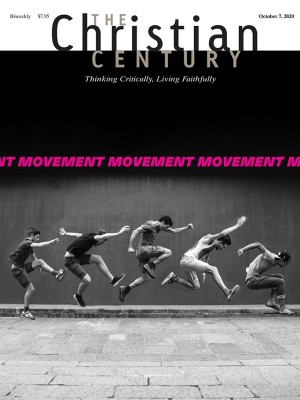I don’t have a personal relationship with Jesus
I experience God through the embodied community of faith—and I miss it.

Under normal circumstances, our church holds a Blessing of the Backpacks at the beginning of each school year. Unable to do that now because of COVID-19, we decided instead to deliver “blessing bags” to all the kids in the church. So I recently spent a couple of days driving around my town, delivering colorful gift bags filled with notebooks, stickers, prayer cards, and lollipops to families I had not seen in person since March. I lingered for a few socially distanced moments at each front door, checking in with parents, waving hello to children, and trying to make an authentic connection through the pleated layers of my face mask.
The interactions were brief and sometimes clumsy. But they were something. Something, I realize now, that I’ve been starving for since the pandemic began. Something deep, communal, and spiritual that cuts to the heart of what Christianity has come to mean in my life.
Read our latest issue or browse back issues.
When I was growing up, the primary way Christians I knew described their faith was as a personal relationship with God. The idea was everywhere in our Sunday morning music, which often sounded like love songs. It was ubiquitous in sermons and in the favorite spiritual expressions of my fellow churchgoers: “Christianity is a relationship, not a religion.” “Jesus is my best friend.” “God walks with me and talks with me and tells me I am his own.”
Years later, I was stunned to realize that this phrase “personal relationship,” which saturated my religious upbringing, does not come from the Bible. Nor does the Bible ever instruct me to “invite Jesus into my heart as my personal Savior.”
I’m not saying that these expressions don’t hold value. But as I struggle through week after week of coronavirus-induced isolation, connecting with fellow Christians only on screen or by phone, I wonder if contemporary Christianity’s emphasis on personal religious experience has more to do with American individualism than it does with the Bible or with Christian tradition. I also wonder if the inclination on the part of many busy Christians to skip church and go it alone is a catastrophic mistake.
Given my own history, I fear that the language of personal relationship does more harm than good when it is universalized. I have spent many years now feeling spiritually deficient because I don’t have a personal relationship with God. I’ve certainly hungered for the kind of intimacy I sang about so earnestly as a child and young adult. But to claim that I experience a one-on-one intimacy with God that is truly personal would be a lie. God doesn’t walk with me and talk with me and tell me I am God’s own. I don’t feel God’s arms holding me close. Jesus is not my best friend.
But I do experience God’s presence and power in community—in shared worship, liturgy, song, and prayer. In the breaking of bread and sharing of wine. In the wise words of my spiritual mentors, the warm hugs of my believing friends, the shared labor and enjoyment of a sacred meal, the energy and exuberance of our parish children.
When I connected in person with fellow parishioners this week, I experienced a tiny spark of what I’ve missed since the pandemic separated us. My spiritual bedrock is not a personal relationship with God; it’s the mystery of the incarnation, fleshed out in embodied community. It’s in the faces, voices, hands, and feet of the body of Christ that I experience Christ. It’s in the laughter of other people that I hear God’s joy. It’s in the tears of other people that I see God’s broken heart. It’s in messy human connection that God’s redeeming love streams into my life.
I’m not denying the experiences of Christians who enjoy deep, one-on-one intimacy with their Creator. I’m just being honest enough to admit that I don’t—and to consider whether it’s time to let this long-held expectation go. Maybe it’s time to accept the hunger itself—the aching loneliness I feel as I fast from embodied community during the pandemic—as a kind of holy intimacy, a promise of a union still to come. After all, what is faith but the living out of a hope that is not yet realized?
And if it is, won’t my love and compassion for a broken, starving world grow deeper if I acknowledge my own hunger and sit with it honestly? Won’t I become God’s hands and feet more readily if I confess God’s absent presence in these days of social distancing?
During his last days on earth, Jesus spent a lot of time talking about absence. (“You will look for me, but you will not find me, and where I am, you cannot come.”) After his resurrection, he allowed Thomas to see and touch his scarred body but commended more highly those who trust in God without the benefit of personal experience.
Despite everything I’ve just written, it still feels scandalous to admit that I don’t have a personal relationship with God. I hope someday it won’t sting so much to tell this truth. But I hope even more fiercely that I will learn to give voice to what I do have: hunger, yearning, hope, and anticipation. A limping but dogged faith that lives in the shadow of a searing absence during these hard, lonely days of masks, temperature checks, and Zoom.
A version of this article appears in the print edition under the title “When Jesus isn’t personal.”







